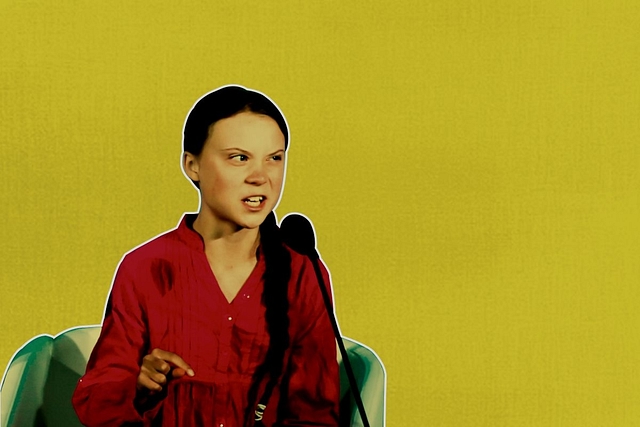
I Am A Teenager Myself And Here’s Where I Think Greta Is Wrong
What Greta disparages as “fairytales of economic growth” is the ladder to climb out of poverty for millions in emerging economies.
“You have stolen my dreams and my childhood with your empty words!”
So thundered 16-year-old Swedish teen climate-change activist, Greta Thunberg, a week ago, on the stage of the Climate Action Summit — an annual gathering of world leaders conducted to discuss climate change — at the United Nations headquarters in New York.
Thunberg, who rose to prominence after her protest in front of Sweden’s parliament in August last year, holding her trademark hand-made ‘Skoltrejk for Klimatet’ (school strike for climate change) banner, has become a global teen climate strike icon — with millions of students, inspired by her, skipping schools on Friday across the world to participate in climate-change protests.
Amid all her emotional histrionics and fierce activism at the UN — globally praised by libertarians — Greta left too many loose ends. Although it would be preposterous to dismiss hers, and all teenagers’ climate activism as groundless, wrongful or some Joan of Arc syndrome — especially amid the rising threat of global climate change — still, there remain some loopholes in her activism.
Being a teenager and playing an active part in the crusade against climate change myself, I feel Greta’s passion and concerns for our generation’s future. But despite our shared interests and concerns, I feel fundamentally opposed to blindly subscribing to every bit of her activism and, I cannot ignore or overlook some of the unjust shades of her concepts with regards to the global order.
For instance, her words:“you have stolen my dreams and my childhood with empty words”. Judging the merit of this statement, overlooking all emotions and, of course, undeniable courage, it is fundamentally wrong.
Our generation has grown in the most prosperous time in history with the most advanced facilities and advantages at our disposal. Global poverty is at an all-time low and more and more people are coming out of poverty every year.
Life expectancy is at the highest, disease and global hunger is at the lowest than ever in human history. We are living the most comfortable life with state-of-the-art technologies. Despite all the skirmishes and minor fracases, our generation, mostly, has grown without having to witness any wars; sound and safe inside secure borders.
Climate change is, undoubtedly, the biggest danger waiting at the doorstep to ruin our lives, but still, mostly, we’ve not been affected by it to such an extent as to say it has stolen our dreams and childhood.
Though if climate actions remain in deadlock and paralysed into stagnation, the time will come when our technological advancements will fail against climate’s challenges, but that time is not now. We cannot let the fear of the future override and overpower our life in the present.
Greta goes on to say: “We are in the beginning of a mass extinction and all you can talk about is money and fairytales of eternal economic growth. How dare you!” Despite all the real challenges to our lives from climate change, using the words “the beginning of a mass extinction” to describe the situation could at best be called a lazy attempt at fearful embellishment.
And the most unjust, irrelevant and misplaced uttering was her shot at “fairytales of eternal economic growth”. What Greta disparages as “fairytales” is the ladder to climb out of poverty for millions in emerging economies, a means of ensuring basic needs and an ambition to provide a happy, high standard of living.
It is this “economic growth” that will ensure to children in the developing world, those very comforts and education which Greta got in her first-world developed country, Sweden. And it is this same “economic growth” which is and will be an essential instrument in fighting climate change.
There are still more people dying of hunger and disease than climate change, and to improve their lives, economic growth is paramount. We cannot expect governments across the emerging world to shift their goalposts from ensuring economic growth to tackling climate change at the cost of economic growth.
What we can expect, and ask for, is ensuring greater eco-friendly growth with prudent policies to tackle climate change.
One phrase that Greta has been recorded saying quite often is that the world, and most of the leaders, are doing "business as usual”. This may be definitely true for many countries with full potential but no leadership commitments towards climate crisis mitigation, but to impose this generalisation on every nation would be unjust, in my view.
In a video message to the Indian Prime Minister, Greta asked Modi to stop doing “business as usual”. It should be clear to any keen mind, through a little research, that Modi is steering India towards a greener future, leading the climate change battle and building a base for better eco-friendly growth in the country.
Sometimes Greta could acknowledge the positive side of the struggle, boosting some optimism and not confine herself and the teenage activism to complete pessimism.
Teenagers around the world, instead of boxing themselves into only one part of the struggle and becoming pessimists by only looking at the problems, must focus more on solutions.
Whether our elder generation will listen to us and bring some prudent and realistic long-term reforms is uncertain. But what is certain is that in a couple of years, we will the ones in the driving seat, looking at the crisis at our doorsteps, and ready to vote.
Hence it’s exceedingly important that our generation — the future leaders — focus on solutions to not only tackle and mitigate but also, to some extent, reverse climate change.
We can learn and get inspired from many others who are currently fighting the climate change. As Mahatma Gandhi said, “Be the change you wish to see in the world.”